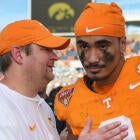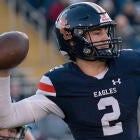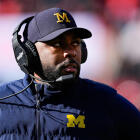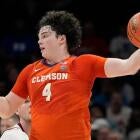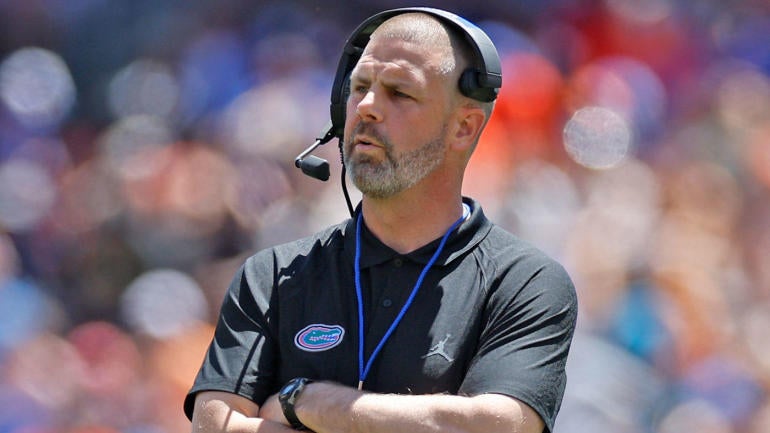
Florida coach Billy Napier's process hasn't led to many good finishes on game days over the last two years, so he made wholesale changes in the offseason that stretched from defense and special teams to the strength program. He even changed what his players eat.
"Each year we try to ask ourselves: If you were starting over, what would you do differently?" the third-year Florida coach told CBS Sports. "And make the necessary changes. We've got to continue to evolve and adjust."
It's desperation time in The Swamp, where a proud program fears sinking into the depths of the SEC amid a new era of riches, conference expansion and unprecedented competition. How and why this blueblood fell on hard times is not necessarily worth rehashing. The past is the past, and only the results -- not the process -- matter. Napier enters a crucial third season with an 11-14 record marred by late-game coaching mistakes. He's an unbelievable 1-9 against Kentucky, Florida State, Georgia, LSU and Tennessee.
He is also the first Florida coach since the mid-1940s to survive back-to-back losing seasons (Raymond Wolf, 1946-47).
Florida supporters will not stand by after a third losing year. How Napier saves his job is simple yet unquestionably daunting: Finish Year 3 with a winning record against perhaps the toughest schedule in college football history.
Eight top 25 teams in the CBS Sports 134 pepper the schedule, and the final five games provide a slate of fire-me-now contests: five ranked teams, including four top-10 programs, and only two opponents travel to The Swamp. The Gators open the season Aug. 31 against rival Miami, a program with ACC championship aspirations, in The Swamp.
Interestingly, Napier has seemingly asked for patience since a disastrous 5-7 season ended with five straight losses. "When we took the job, what we inherited, the work that needed to be done, I think we're on schedule to some degree," he told a small gathering of reporters at SEC Media Days.
That comment raised eyebrows across the country and quite a bit of ire from the Florida faithful. Napier, however, has never been one to shy away from contextualizing the Gators' rebuild. The former Louisiana coach has remained steady in his belief that it would take several years to put Florida back on the national map.
"We live in a society that wants it now," Napier said two weeks ago, punctuating his point with a loud clap. "It doesn't happen that way, in anything, much less football. So when you've got hundreds and hundreds of people to coordinate in the same direction in today's climate, it's even more difficult to establish trust. We're over the hump. Kids that are on our team now, they picked the University of Florida, and our staff picked them. The makeup of our team is different, and it will be very obvious when we start playing this fall."
The Gators will certainly look different, but will the results change? Florida shed 500 pounds of fat and added 500 pounds of muscle after shifting to a new strength and conditioning program that was fueled by a complete shift in nutritional science, Napier explained. He promoted Tyler Miles to lead the strength program and brought in a nutritionist from the NFL's Washington Commanders to retool players' diets.
"Everything we do in there has a purpose. Everything is driven by data," said quarterback Graham Mertz.
"We made significant progress," Napier said. Our team looks different -- all the numbers, the metrics, the speeds, the strength improvement, not to mention the culture."
Napier also made wholesale changes on defense and special teams, siding with seniority over the comforts provided by the familiar faces from his past in the Sun Belt. He demoted first-year coordinator Austin Armstrong in favor of veteran Ron Roberts on defense. In the offseason, Roberts practically instituted a Football 101 class on the field, reteaching tackling fundamentals, linebacker Shemar James said. From gator-roll tackles to the fundamentals of leading the same shoulder with the same foot, the Gators went back to the basics.
Napier also pushed aside "GameChanger coordinator" Chris Couch, who oversees special teams, and hired former New England Patriots assistant Joe Houston to correct a multitude of in-game substitution issues over the last two years. They finally installed a substitution mat on the sideline, a common tool used by many teams to help coordinate substitutions for all 11 players on special teams. A player simply stands in one of 11 circles on the mat. Such a tool might have led to a winning season in 2023 when 20 players ran onto the field for a game-winning field goal attempt against Arkansas.
The roster is also notably deeper and better than last season. Seventeen starters return. Mertz is in his second year leading the Gators offense, ballooning a veteran career to six years after an up-and-down tenure at Wisconsin. The team's returning players combined for nearly 41,000 snaps last season.
"One of the reasons I believe in our team is we have credible leadership," Napier offered.
How so?
"I knew this team had a chance to be different. Go back to January. I'm taking the boys to the office. (Sons) Sammy and Charlie are with me. … We walk around the corner, we've got 70 guys in the weight room on a Saturday doing extra work. I used to play for an old coach that said champions do extra. I'm going to tell you, this group, that has continued. It's been consistent.
"Just a few weeks ago, 4th of July, we have 53 guys that are in there on Saturday doing extra work."
Napier's career has been more about what he's lost than what he's gained. Three of the final four losses last season were by single digits.
Despite Napier's good intentions, the Nick Sabanesque process and his openness to evolve and make wholesale changes, not all of the attrition was part of a grand design. It took two years for Florida's NIL programs to align, which certainly hindered recruiting. Former Florida prospect Jaden Rashada, now at rival Georgia, is suing Napier over a failed NIL deal.
In March, running back Trevor Etienne ruffled feathers when he left for rival Georgia and explained: "I can stay Running Back 2 on a losing team or go somewhere and possibly be Running Back 1 and win a natty."
In late July, Florida lost its chief of staff, Mark Robinson, to Georgia.
If it's not clear already, circle Nov. 2 as potentially Napier's final toast. The World's Largest Outdoor Cocktail Party against Georgia is also the start of the Gators' five-game sentence on murderers' row.
Fair or not, Napier's career will be defined by how he performs against the most difficult stretch in the sport's history. Should Napier make it through November with a winning record, he's the sport's coach of the year. Anything less means another wholesale change, bu this time without Napier calling the shots.
![[object Object] Logo](https://sportshub.cbsistatic.com/i/2020/04/22/e9ceb731-8b3f-4c60-98fe-090ab66a2997/screen-shot-2020-04-22-at-11-04-56-am.png)











